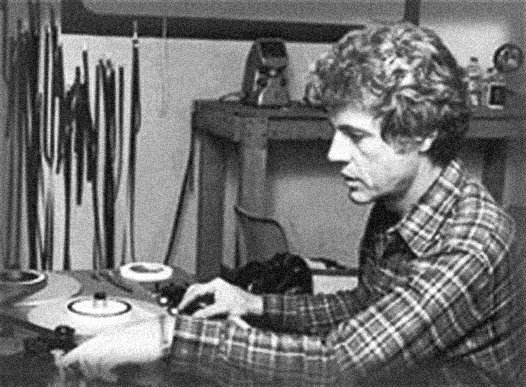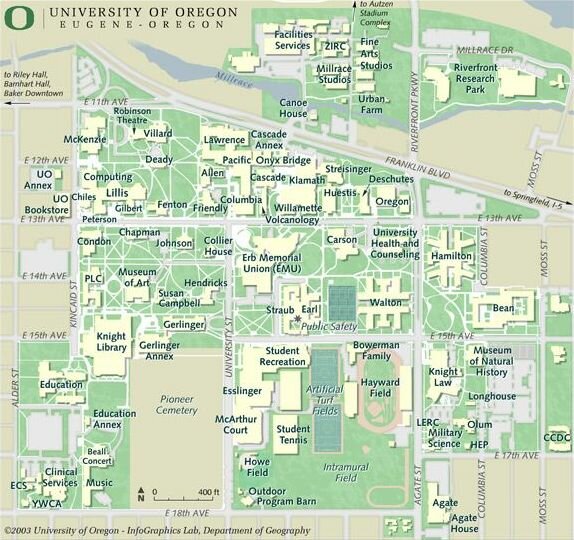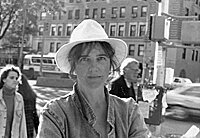.
Richard Herskowitz was astonished to read on Oregon Movies, A to Z that James Blue (1930 – 1980), one of the most respected and influential documentary filmmakers of all time, was an Oregonian, and a graduate of the University of Oregon. He immediately went into high gear organizing a five month retrospective to celebrate the life and work of this distinguished artist.
The retrospective begins on Wednesday, Nov. 13, at 7:00 PM at Schnitzer Cinema inside the Jordan Schnitzer Museum of Art in Eugene.
Gerald O’Grady arrives from New York, where he taught with James Blue at the Center for Media Study at SUNY-Buffalo. O’Grady will introduce The March (1964), James Blue’s 33 minute documentary of the historic 1963 March On Washington.
The second event of the series will take place on Wednesday, Dec. 11, 7:00 PM.
Richard Herskowitz, the director of the Schnitzer Cinema, will continue to pair selected films by James Blue with speakers - friends, colleagues and film scholars - who knew the filmmaker personally. Since James Blue made films around the globe, it is likely that the speakers will come from far and wide as well. On Dec. 11, the film will be the 35 minute A Few Notes About Our Food Problem, which received an 1968 Oscar nomination.
I’m looking forward to the way this series will illuminate Oregon’s regional specialty of creating dynamic writer-producer-directors. James Blue, born at the dawn of sound filmmaking in 1930, was one of the first.
Who was James Blue?
James Blue arrived in Portland with his family from Tulsa in 1942. He began making films on 8mm while attending Jefferson High School, and majored in theater at University of Oregon, graduating in 1953. Ten years after graduation, he won the Critics Prize at Cannes, an honor never before given to an American. He won for The Olive Trees Of Justice, a narrative feature shot in Algeria, with a cast which included non professional actors. Returning to this country, Blue would combine teaching and filmmaking for his entire career, excelling in both fields.
The Olive Trees Of Justice is a rare film. I have never seen it. It is not on DVD. Thankfully, Richard Herskowitz knew where to find it. He is including it in the retrospective, date to be announced. A very rare opportunity!
The first two events of the five part series are announced on the Schnitzer Cinema website.
For more information about James Blue, the best source is this guide created for a previous retrospective in 2005.
The following filmography comes from the Facebook page Remembering Documentary Filmmaker James Blue (1930-1980):
Films by James Blue
Hamlet (1951-52, 8mm) made at UO
The Silver Spur (1956, 16mm) made in Portland
Une Tragedie en Trois Mauvaises Actions (1958, 35mm, at IDHEC in Paris)
Le Voleur (Algeria, 1960, 35mm, 20 min.)
Amal (Algeria, 1960, 35mm, 21min.)
La Princesse Muette (Algeria, 1960, 12 min.)
L’Avare (Algeria, 1960, short)
Le Jardin des Roses (Algeria, 1960, 18 min.)
L’Endormi (Algeria, 1961, 35mm, 10 min.)
Le Menuisier (Algeria, 1961, 35mm, 10 min.)
Le Match-de-Catch (Algeria, 1961, 12 min.)
Les Oliviers de la Justice (Algeria/France, 1962, 35mm, b/w, 90 min.) winner at Cannes
Letter from Columbia (US, 1962, 35mm, 10 min.)
School at Rincon Santo (US, 1962, 35mm, 10 min.)
Evil Wind Out (US, 1962, 35mm, 10 min.)
The March (The March to Washington, US, 1963-1964, 35mm, 33 min.) Blue’s most widely seen work.
Prologue to George Roy Hill’s Hawaii (1966)
A Few Notes On Our Food Problem (US, 1968, 35mm, color, 35 min.) Nominated for an Oscar.
Karate Texas (1971-1973, Super-8, color, unfinished)
Kenya Boran (with David MacDougall, 1974, 16mm, color, 66min.)
Who Killed The Fourth Ward? (1976-1977, Super-8 and video, color, 3 one-hour segments)
The Invisible City: Houston Housing Crisis (Super-8 and video, color, 5 one-hour segments)
The events in the James Blue Retrospective are free. The Schnitzer Cinema is located within the Jordan Schnitzer Museum of Art, just north of the Knight Library, on the University of Oregon campus in Eugene.
For the final event of the series, Richard Herskowitz is coming to Portland on April 24 -26 to partner with the Northwest Film Center and the What is Documentary film festival at the White Stag Building.
Amazing! This celebration of Oregon genius began with a simple post on Oregon Movies, A to Z.




2 responses so far ↓
1 Richard Blue // Nov 17, 2013 at 5:26 am
All praise to Richard Herskowitz for helping to re-discover my brother’s work, and to Gerald O’Grady for mentoring James when he was alive, and for keeping the flame alive so many years. I’m excited that with the help of Richard Herskowitz and his colleague at the University of Oregon, James Fox, the University will become the official archive for James Blue’s entire work. I’ll be at the December screening of the Academy Award nominated “A Few Notes on Our Food Problem”. I hope to see you in Eugene.
2 Anne Richardson // Nov 18, 2013 at 5:34 pm
I am looking forward to it!
Leave a Comment